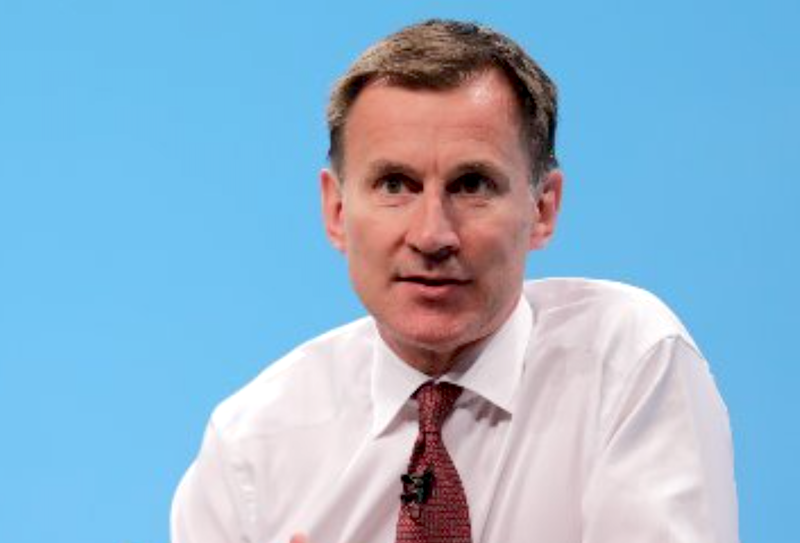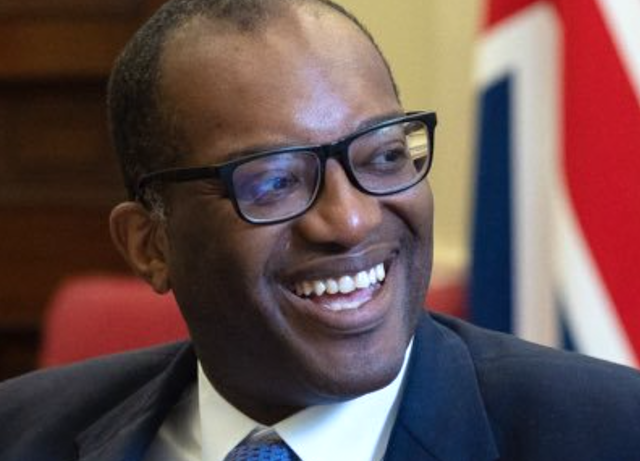Britain’s new finance minister Jeremy Hunt said on Saturday that some taxes would go up and tough spending decisions were needed.
His remark signals further reversals from Prime Minister Liz Truss as she battles to keep her job just over a month into her term.
In an attempt to appease financial markets that have been in turmoil for three weeks, Truss fired Kwasi Kwarteng as her chancellor of the exchequer on Friday and scrapped parts of their controversial economic package.
With opinion poll ratings dire for both the ruling Conservative Party and the prime minister personally, and many of her own lawmakers asking, not if, but how Truss should be removed, she has turned to Hunt to help salvage her premiership less than 40 days after taking office.
“We will have some very difficult decisions ahead,” Hunt said as he toured TV and radio studios to give a blunt assessment of the situation the country faced, saying Truss and Kwarteng had made mistakes.
“The thing that people want, the markets want, the country needs now, is stability. No chancellor can control the markets,” Hunt said.
“But what I can do is show that we can pay for our tax and spending plans and that is going to need some very difficult decisions on both spending and tax,” he added.
Truss won the leadership contest to replace Boris Johnson on a platform of big tax cuts to stimulate growth, which Kwarteng duly announced last month.
“But the absence of any details of how the cuts would be funded sent the markets into meltdown.
She has now ditched plans to cut tax for high earners, and said a levy on business would increase, abandoning her proposal to keep it at current levels. But it is not clear if that has gone far enough to satisfy investors.
Hunt is due to announce the government’s medium-term budget plans on Oct. 31, in what will be a key test of its ability to show it can restore its economic policy credibility. He said further changes to Truss’s plans were possible.
“Giving certainty over public finances, how we’re going to pay for every penny that we get through the tax and spending decisions we make, those are very, very important ways that I can give certainty and help create the stability,” he said.
He cautioned spending would not rise by as much as people would like and all government departments were going to have to find more efficiencies than they were planning.
“Some taxes will not be cut as quickly as people want, and some taxes will go up. So it’s going to be difficult,” he said, adding that he would sit down with Treasury officials on Saturday before meeting Truss on Sunday to go through the plans.
Kwarteng’s Sept. 23 fiscal statement prompted a backlash in financial markets that was so ferocious the Bank of England (BoE) had to intervene to prevent pension funds being caught up in the chaos as borrowing costs surged.
Hunt, an experienced minister and viewed by many in his party as a safe pair of hands, said he agreed with Truss’s fundamental strategy of kickstarting economic growth, adding that their approach had not worked.
“There were some mistakes made in the last few weeks.
“That’s why I’m sitting here. It was a mistake to cut the top rate of tax at a period when we’re asking everyone to make sacrifices,” he said.
It was also a mistake, Hunt said, to “fly blind” and produce the tax plans without allowing the independent fiscal watchdog, the Office for Budget Responsibility, to check the figures.
The fact that Hunt is Britain’s fourth finance minister in four months is testament to a political crisis that has gripped Britain since Johnson was ousted following a series of scandals.
Hunt said Truss should be judged at an election and on her performance over the next 18 months – not the last 18 days.
However, she might not get that chance. During the leadership contest, Truss won support from less than a third of Conservative lawmakers and has appointed her backers since taking office – alienating those who support her rivals.
The appointment of Hunt, who ran to be leader himself and then backed her main rival ex-finance minister Rishi Sunak, has been seen as a sign of her reaching out, but the move did little to placate some of her party critics.
“It’s over for her,” one such Conservative lawmakers told Reuters after Friday’s events.
The next key test will come on Monday, when the British government bond market functions for the first time without the emergency buying support provided by the BoE since Sept. 28.
Gilt prices plunged late on Friday after Truss’s announcement.
Newspapers said Truss’s position was in jeopardy, but with no appetite in the party or country for another leadership election, it was unclear how she could be replaced.
“Even Liz Truss’s most loyal allies, viewing the matter through the most rose-tinted glasses available, must now wonder how she can survive,” the Daily Mail tabloid, which had previously given Truss strong support, said in its editorial.
“Yet what is the alternative?”


